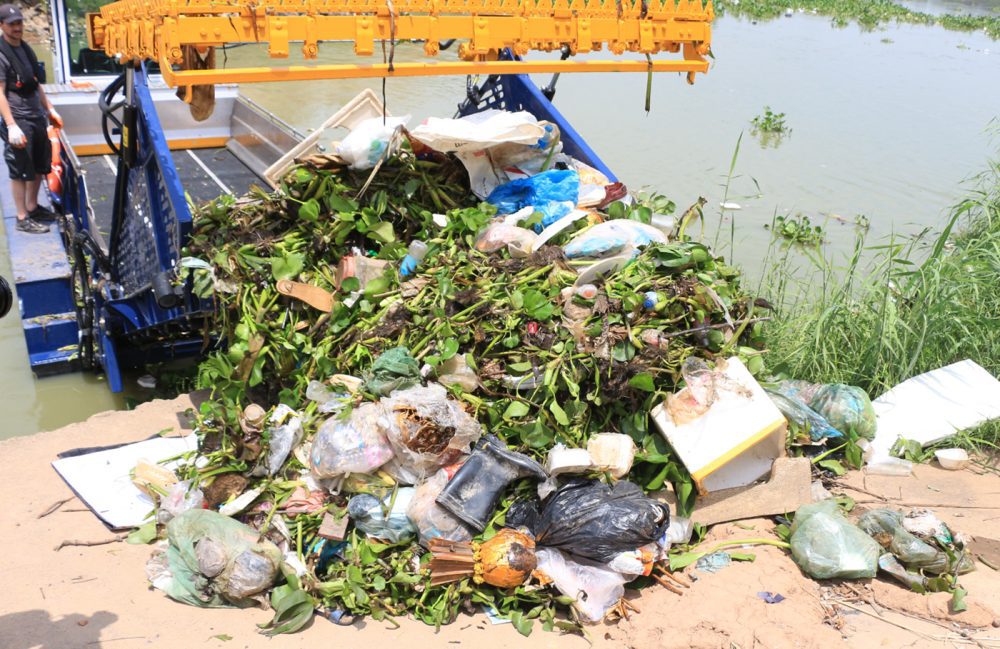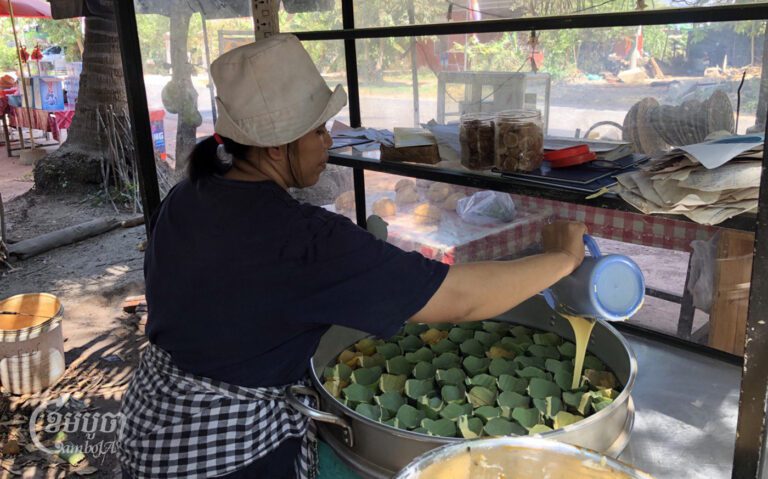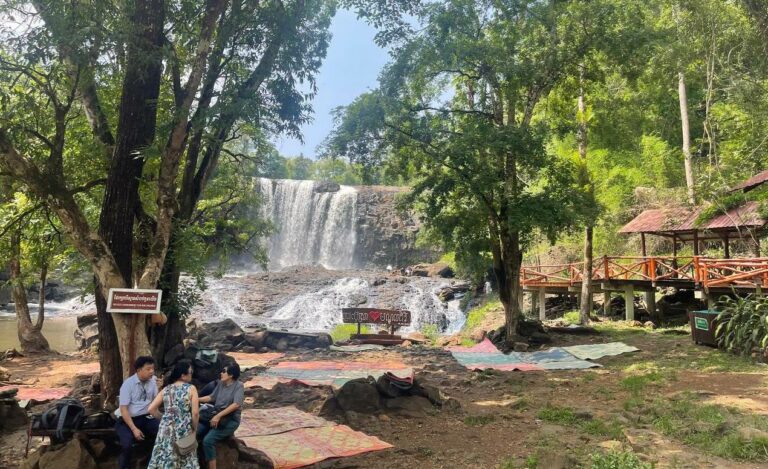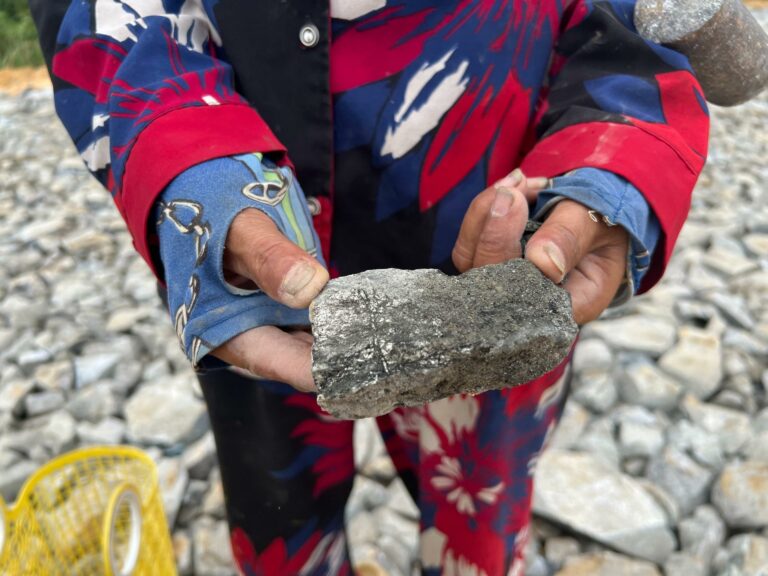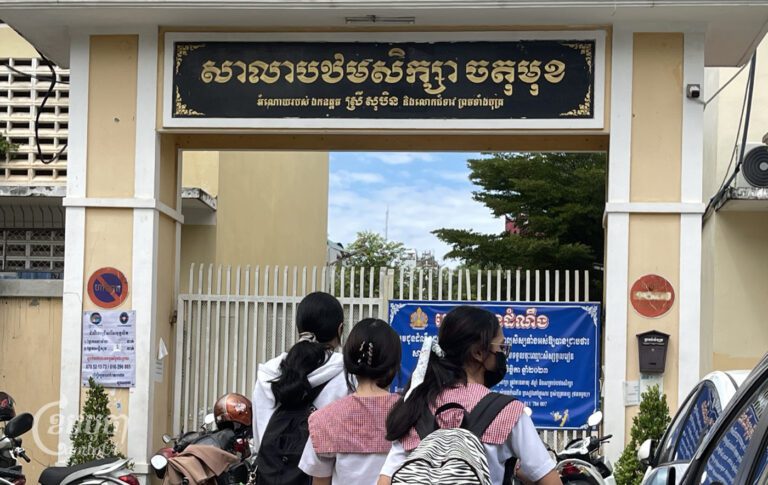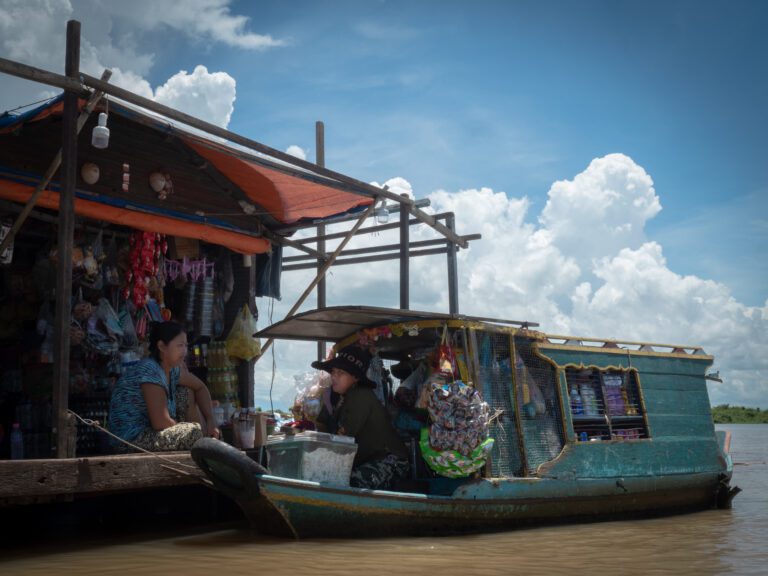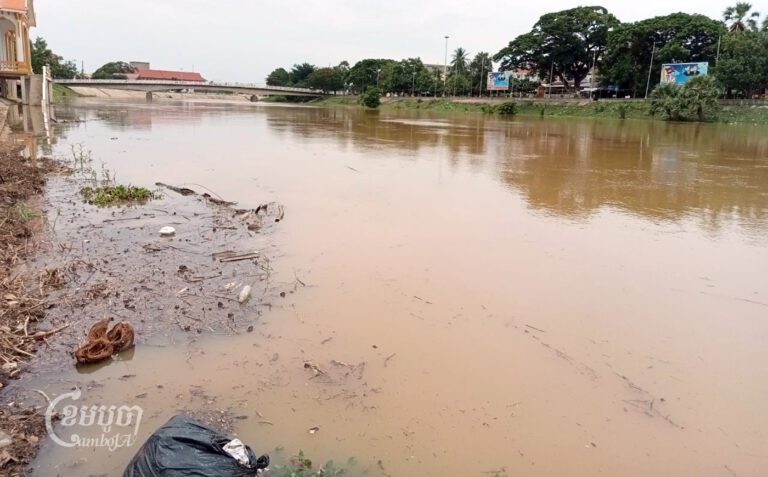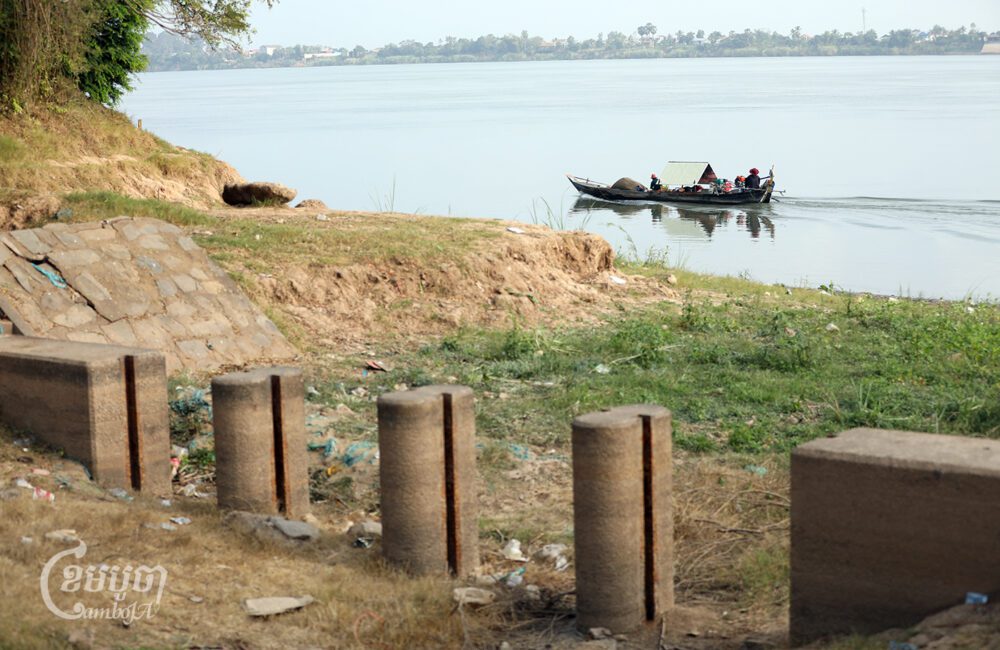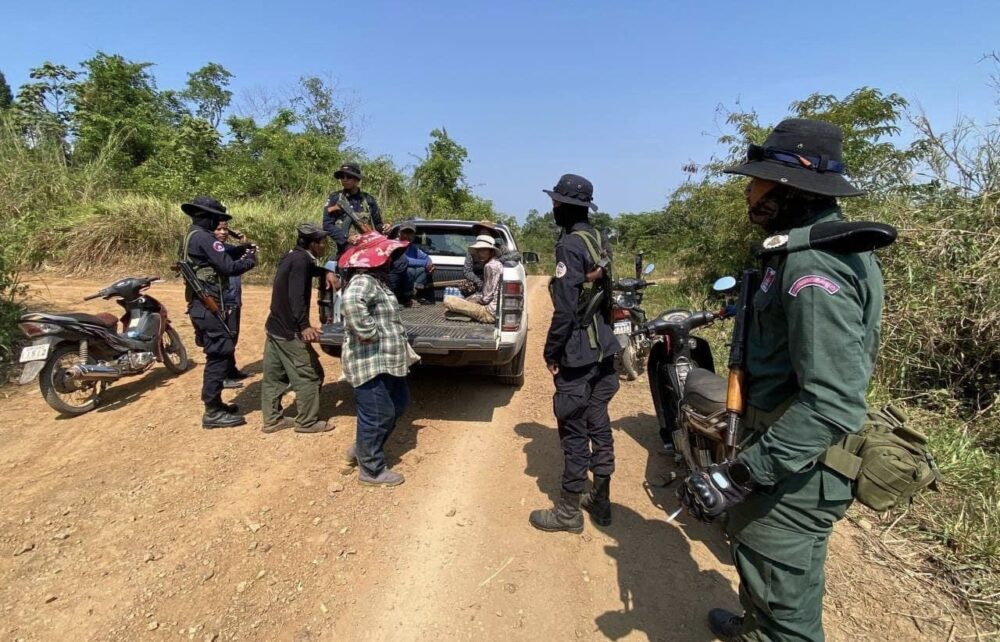The Ministry of Tourism and other relevant ministries, in cooperation with the Everwave company and the River Ocean Cleanup organization, has launched a mission to clean Phnom Penh’s three rivers using a garbage collection boat equipped with a new German technology.
Top Sopheak, a spokesman of the Ministry of Tourism, said that the boat will clean up the Mekong, Bassac, and Tonle Sap rivers in Phnom Penh from March to June this year. The project is done in partnership with the Phnom Penh Municipality, the Ministry of Tourism, the Ministry of Environment, and the Ministry of Public Works and Transport.
“This is the first pilot project of Everwave and River Ocean Cleanup in Phnom Penh,” Sopheak said. “Our professional officers are also participating in this campaign.”
He cautioned, however, that the ministries won’t be able to declare whether the pilot project is successful only after three months, as the clean-up needs to be done on a regular basis for results to be seen. He said that this is merely a demonstration of a new technology that collects waste in water, rather than on land.
Thong Khon, the Minister of Tourism and Chairman of the National Committee for Clean City Assessment, said during the opening ceremony of the clean-up campaign at the riverside park facing Wat Ounalom, that this project is being implemented in response to the national clean-up the government has called for – “Clean Cambodia, Clean Phnom Penh, Clean Nationwide” – in preparation for the 2023 SEA Games in Cambodia.
Nou Sovann, Executive Director of River Ocean Cleanup, said that one boat has been brought in to clean the rivers in the first phase. Eventually, the plan is to bring four.
“For this campaign, we [the teams] first started with the Bassac River, a river with a lot of garbage both in the river and along the riverbank,” Sovann added. He also told CamboJA that they have planned six measures to end littering in and along the rivers and its surrounding public spaces.
The first is to clean the river itself using a boat called “Oringa by Landmarken”.
The second is to clean the riverbank, which extends 200 meters from the river, using three methods: encouraging resident communities to prevent garbage from spilling into the river, forming a team in the commune to collect garbage along the river, and buying the garbage collected by residents at a rate of 300 Riel per kilogram.
The third is to cooperate with private companies, schools, and students to collect garbage by organizing events to bring communities together.
Beyond that, Sovann said the waste would be sorted and be recycled wherever possible. The recyclable waste would be taken to Chip Mong company to be converted into cement energy. Residents and students living along the river would also be educated on safe waste disposal.

Sovann said the next task would be to build infrastructure for waste management, such as trash storage, so that the public can properly store trash rather than throwing it out. “In the long run, we will look into what kind of large-scale infrastructure we can develop together,” he said.
Safi, a 33-year-old Khmer Muslim who works as a fisherman, has lived on a boat along the bank of Mekong river, near the Sokha Hotel in Phnom Penh, for more than 10 years. When CamboJA spoke to him, he was sitting in the shade of the wide thatched roof of his boat, surrounded with trash and plastic bottles on the riverbank.
“I used to throw garbage into the river, but only the plastic bags we used at the supermarket,” he said. The rest of the garbage he usually collects and burns near where he lives.
He believes it is beneficial to have a campaign to collect trash along the river so that there is less pollution to the tourism areas. “Nowadays, rubbish is still a problem, but prohibiting it does not do much work, and we [citizens] have no idea where that garbage flows from,” he said.
The proper disposal of solid waste, both in water and on land, is a global as well as a local issue.
According to a Ministry of Environment project that ran from January 2019 to December 2020, the total amount of plastics reached 8.3 billion tons globally in 2015 – equivalent to the weight of one billion elephants – but only about 9 percent of the plastics were recycled. The rest were thrown away in landfills and poured into rivers, lakes, and streams. More than 400 million tons of plastic are manufactured each year.
In Phnom Penh, around 10 million plastic bags are used everyday while the average Cambodian resident living in cities uses more than 2,000 plastic bags each year. According to a 2019 analysis by Fauna & Flora International, residents living in coastal areas in Cambodia use an average of 12 plastic bags per day, with plastic garbage accounting for around 48 percent of total waste tossed into the sea.
San Dara Vit, leader of the garbage collection youth group, told CamboJA that the collaboration is a good thing.
“As far as I understand, most of the garbage on the river consists of water hyacinth. If there is a lot of waste or plastic, it floats away,” he said.
Dara Vit added that his youth group is working to keep the riverbanks clean and to prevent the water level from rising and falling – and any garbage from spilling over.
“Other options for rubbish pick-up from the river, in my opinion, should be considered,” he said.
“The machine’s garbage collection capacity is 20 tons per day,” Nou Sovann said. That aside, he said they will also cooperate with the communities to collect garbage along the riverbank, which will result in more garbage being cleared.
“So far, we [cleaning teams] haven’t concentrated on the quantity [of the garbage]. Instead, our goal is to gather all of the waste from the river so that we can declare, ‘The river in Cambodia is clean; there is no garbage.’”
Top Sopheak said that the nationwide Clean Cambodia campaign is intended to encourage people and the general public – not just the cleaners and garbage collectors – to help clean up the country.
“So, even if there is modern machinery in the water or on land, it is impossible to make the city clean without the participation of our people,” Sopheak said.
San Dara Vit told CamboJA, “It is one thing if there aren’t enough bins, but some of our people [citizens] don’t care, aren’t responsible enough, and don’t go out of their way to search or try to discover rubbish. They have tossed rubbish in the river for many years, and continued to; they didn’t care or collaborate with us.”

Soth Mali, a 31-year-old housewife in Chrang Chamres II commune, told CamboJA, “I always take the garbage and put it in the trash bin on the road.”
However, she said that many people who live along the river throw their waste into the river, including young people who come by the river to eat and leave their food waste.
Peang Voeun, a street vendor who is 34 years old, supports the clean-up campaign, but said that vendors and buyers along the rivers need to dispose of their trash responsibly.
Sao Davy, Interim Executive Director of the Center for Sustainable Water, said kitchen waste, plastic bags, and plastic bottles thrown into the river have a clearly detrimental impact.
He said that the pollution affects the health of all those who live near the river, especially those who use the water without proper filtration. This also costs them financially as they have to spend money on treatment.
He added, “In terms of the environmental impact, it produces foul odors. If [the waste] is not properly managed, it contributes to global warming by releasing methane.”
Top Sopheak called on all Cambodians to better understand the impact of waste pollution, but also to participate in clean-up efforts to make Cambodia as clean as other countries.


